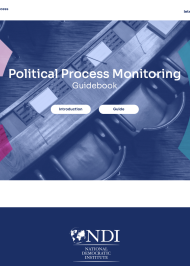
Citizen participation is instrumental in promoting transparent and accountable government, and in fostering the norms that underpin a functioning democratic system. Democracy develops and deepens when citizens are active and exercise their right to be heard, and when they use organized, informed action to hold government accountable for making real improvements in people’s lives.
Citizen-led political process monitoring can be used to promote more open and accountable government, improve government performance and increase citizen engagement. By systematically gathering information and reporting on political processes, such as campaigning for elected office, public budgeting and procurement, lawmaking, or follow-through on policy implementation, civil society organizations (CSOs) and activists can offer assessments, provide data-driven recommendations, and lay the foundation for greater citizen influence over political processes and outcomes.
Political process monitoring initiatives can be implemented by diverse civic actors, ranging from national-level watchdog organizations to local-level groups concerned about quality-of-life issues. These initiatives can focus on a range of processes for different purposes depending on the identified governance gaps. This guide supports five types of monitoring: campaign monitoring; parliamentary monitoring; monitoring government follow-through; budget monitoring and expenditure tracking; and shadow reporting.
Click here to access the guide: https://processmonitoring.ndi.org/





